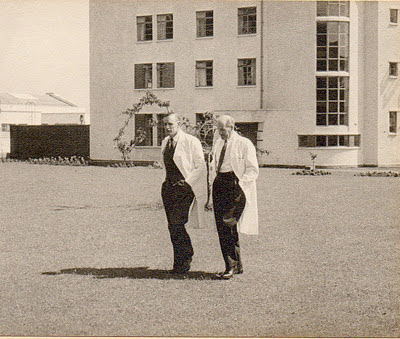Dr Bill Foreman . Superintendent
Sully hospital
Died 19 April 1976.
Age 62.
Dr Bill
Foreman (left) and Dr Len West walking in the grounds of Sully hospital ( circa
1960s).
I am indebted to Dr Foreman's daughter, Jane, for providing me with the following information.:
"A New Zealander by birth, he was known
to all as Bill after the first day of the month when bills arrived though his
real name was Harold Mason.
Born on 1 December 1913 Bill Foreman was educated at
Takapuna Grammar School and Otago University where he won rugby blue for the
New Zealand universities.
After house appointments in Auckland he enlisted in the New
Zealand Medical Corps and was taken prisoner in Greece while remaining with
those wounded who were too ill to be evacuated.
He volunteered to be transferred to a camp where Russian
prisoners were dying from typhus, and, in spite of contacting the disease
himself, remained there for two years.
He worked tirelessly to alleviate the suffering of fellow
British POWs in the Polish town of Cosel.
and when the war ended he was awarded the MBE for his
selfless work.
Throughout his life he was known for his great humanity and
medical skill, often putting his own life in danger.
Dr. Bill Foreman and Dr. Len West with the team of doctors at Sully hospital.
After the war he trained as a chest physician at the
Brompton Hospital. He passed the MRCP in
1947 and was appointed physician superintendent of Sully Hospital in 1951.
There he was able to guide a team of physicians and surgeons
in the control and cure of tuberculosis and then to develop a modern
cardiothoracic unit while at the same time ensuring that his own humanity was
reflected in the running of the hospital.
He knew all the staff personally and introduced many amenities
that made life pleasant for them and easier for the patients and their
relatives.
In his later years it was a matter of great sorrow to him to
see the hospital gradually broken up and he continued to the last to fight for
what he knew was best for his patients.
Bill was a man of great modesty. He never spoke of his past career, but his
eminence in his speciality was recognised by election as president of the
Thoracic Society in 1972.
His knowledge of chest medicine together with his common
sense and sympathy made him an outstanding colleague, but it is as a loyal and
kind friend that he will be mourned by so many.
He bore his final illness with great courage, support by a
strong Christian father and by his family, to whom he was devoted. Dr Foreman is survived by his wife and six children. "
Another lifelong friend, Archie Cochrane, added:
“I was privileged to know Bill Foreman for many years. We met first in London in 1940 on a course
for Army medical officers.”
We met again as prisoners-of-war in Salonika in 1941, and I
was close to him and his family in South Wales for a long time.
Throughout this long and varied period his cheerfulness and kindliness
meant much to me, as to many others. He
was, I think, the kindest man I have ever known.”
Source: British Medical Journal, 29 May 1976- Obituary
Notices - H.M.Foreman MBE,MB,CHB,FRCP




